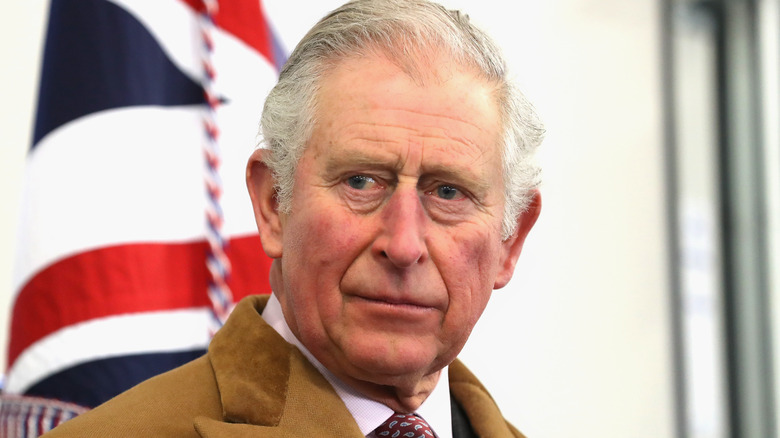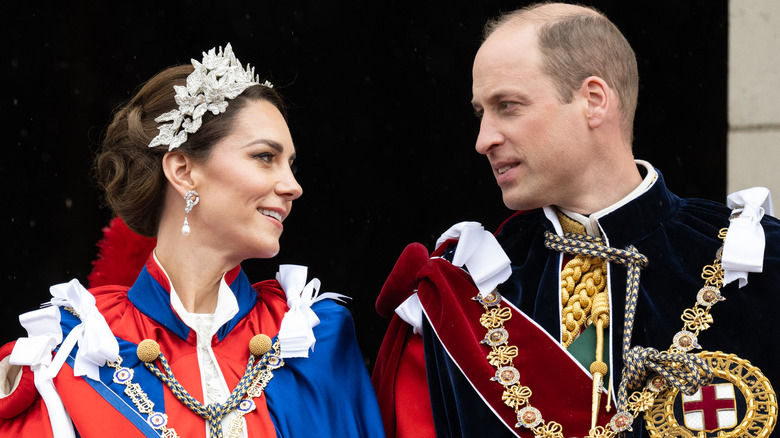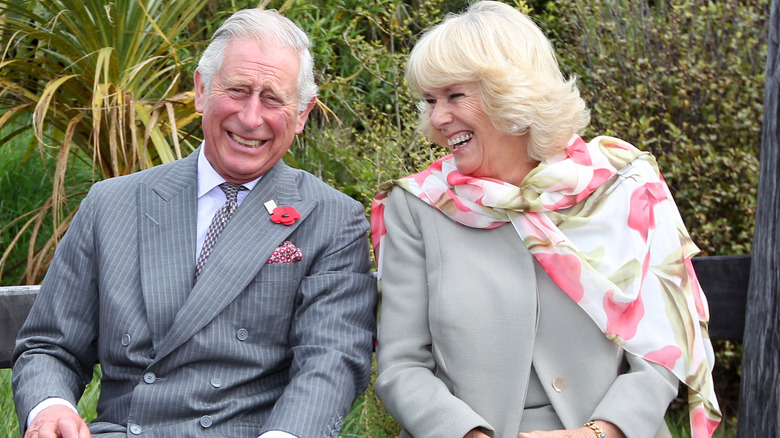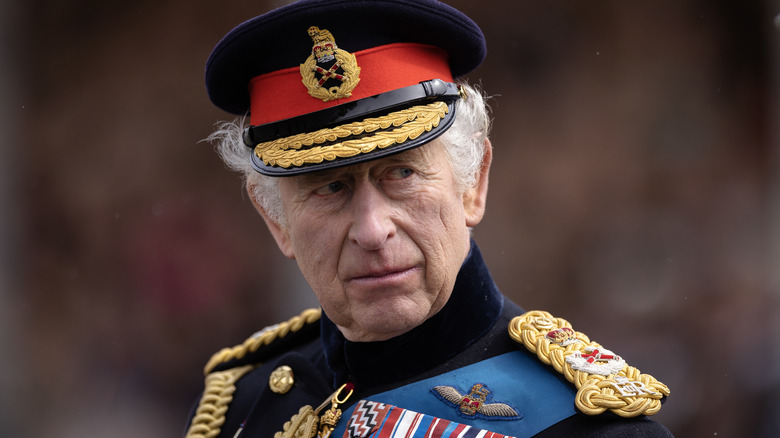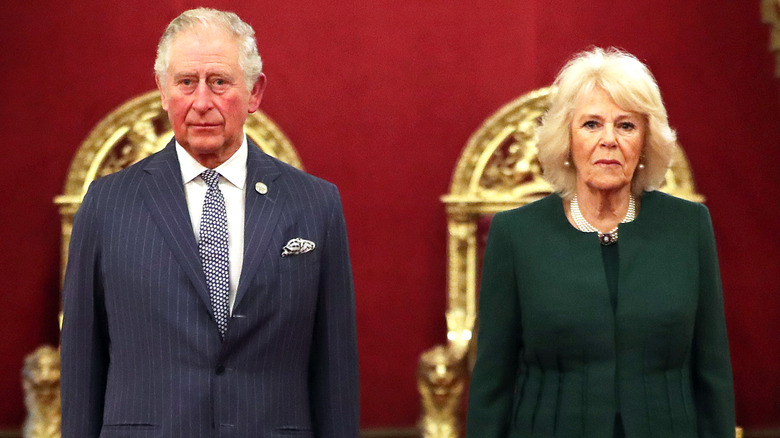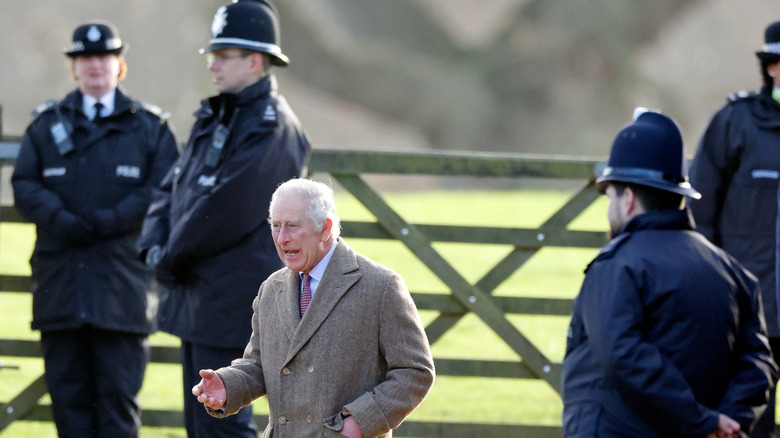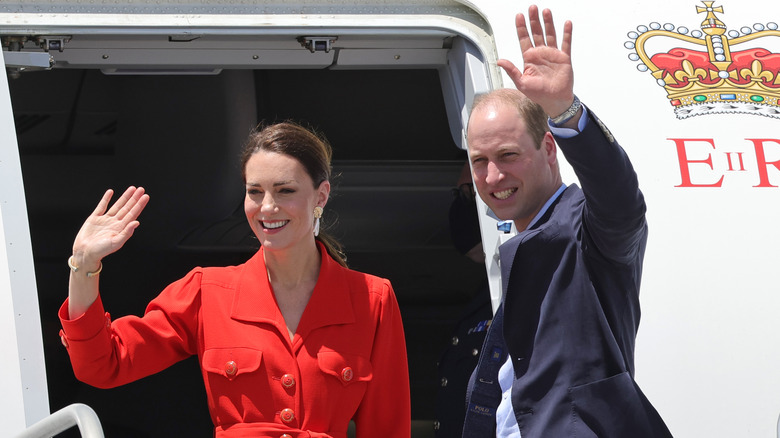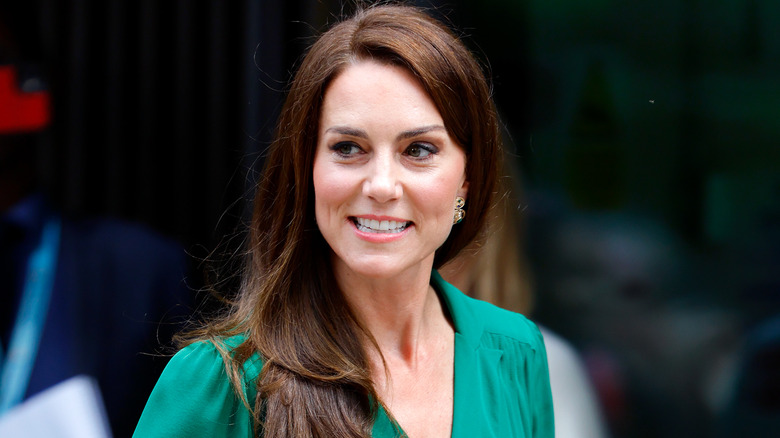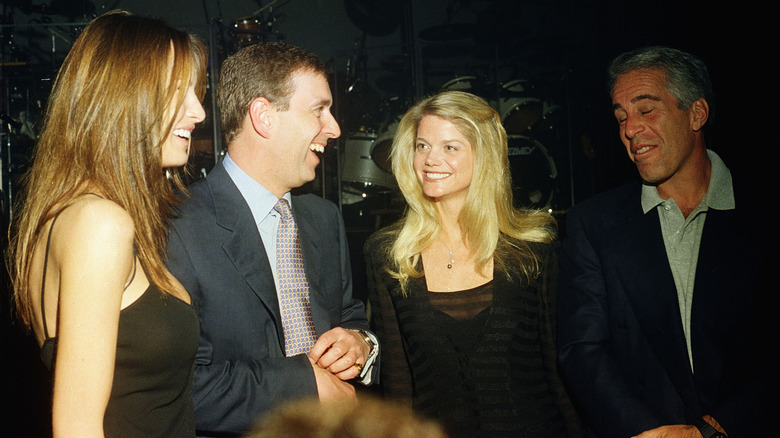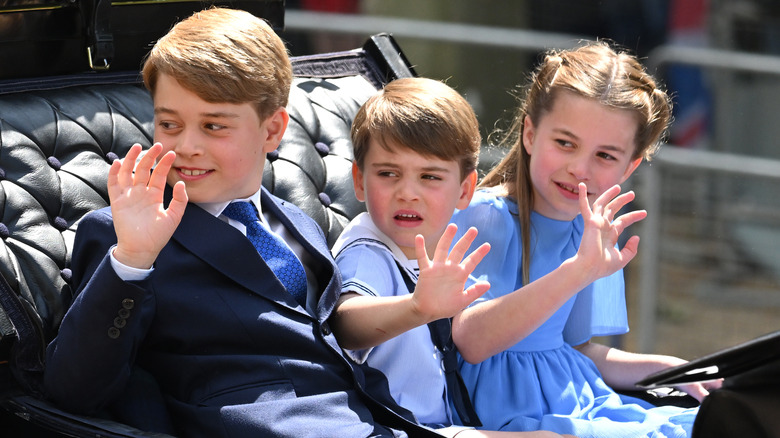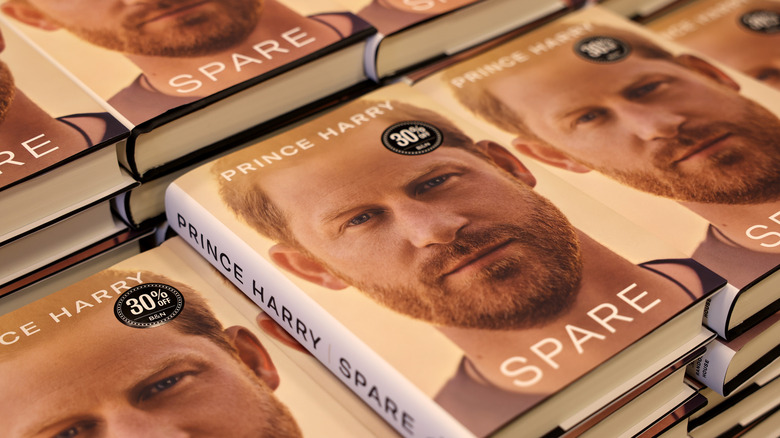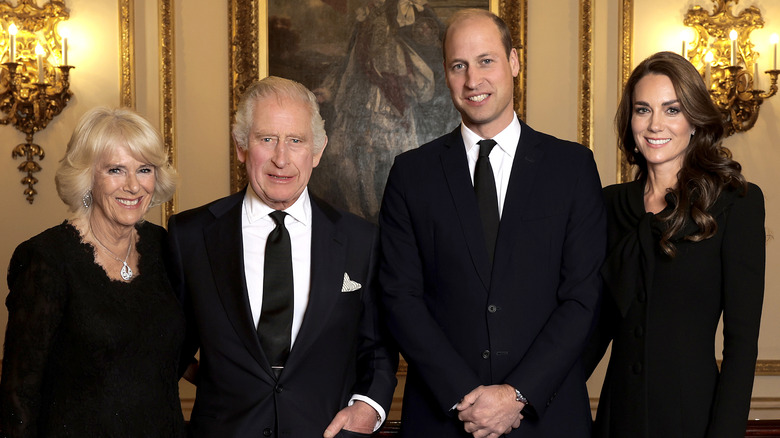What Life Would Be Like For The Royals If The Monarchy Was Abolished
The following article includes brief references to sexual abuse.
Ever since the death of Queen Elizabeth II, the monarchy's popularity has dropped to an all-time low. This is largely attributable to the public's generally ambivalent view of King Charles III, in contrast to the queen's seemingly unwavering popularity. "A lot of the monarchy was tied up with the queen," Graham Smith, CEO of the anti-monarchy group Republic, told Time, "and Charles isn't the queen. ... And then there are big shifts in attitudes — I think that in very different ways, [Princes] Harry and Andrew have done a lot of damage to the monarchy, and so the spell is broken." Reflective of the changing sensibilities of the British public, protests swept the streets of London on Charles' coronation day in May 2023. These were swiftly shut down by the police, and Smith himself was arrested for peacefully protesting, leading to greater public backlash. Following his arrest, membership of Republic nearly doubled.
Even those who once adored the royal family are having second thoughts. "When you really put pressure on the notion that this one family has been born into the world, appointed by god to rule over the United Kingdom and other countries of the world, it's a difficult conversation to have," James Holt, a former royal press secretary, said in an episode of Netflix's "Harry and Meghan."
Let's transport ourselves to an alternate universe in which Britain has a referendum on the royal family — or Regxit, if you will — and find out what life would be like for the royals if the monarchy was abolished.
The royals would keep their titles
In the event that the monarchy is abolished, the royals needn't worry about losing their titles. The former king would not be referred to as Mr. Mountbatten-Windsor; he would get to retain his moniker of King Charles III despite being ousted from the throne. For instance, when Prince Harry and Meghan Markle left royal duties behind, they were nonetheless referred to as the Duke and Duchess of Sussex from thereon in. Moreover, those who hail from countries that have abolished their monarchies, such as Greece and Germany, have retained regal designations. However, such titles have not been without controversy.
In 2022, the UK's Channel 4 News interviewed Prince Pavlos following the death of Queen Elizabeth II and used his royal title, despite the fact that Greece abolished its monarchy in 1973. Referring to Pavlos with regal honorifics angered many Greek republicans. "The Greek people abolished monarchy via referendum half a century ago," tweeted one anti-royalist. "Therefore stop insulting #Greece and spread [sic] fake news. #Greek people advise the people in #England to #AbolishTheMonarchy. Taxpayers wake up and pay NO money to the 'royal' parasites." Meanwhile, another angry detractor wrote, "The Head of State is the President of the Republic. There are no kings, crowns & princes. The Greek Constitution prohibits all kinds of nobility titles. He is not a crown prince, he is a clown prince." Ouch.
The British royals would likely face similar backlash if they chose to keep their titles in a republic.
King Charles III would likely become a retiree
Following the death of Queen Elizabeth II, there was speculation as to whether King Charles III would step down to allow his son, Prince William, to ascend the throne. However, Charles emphatically stated that he had no intention of retiring any time soon. But if Britain abolished the monarchy, Charles and his wife — Camilla, Queen Consort — may be left with no choice but retirement.
Having spent his entire lifetime in a regal bubble, Charles would likely struggle to adjust to life within a republic. As a septuagenarian, he's already entitled to a state pension, which he pledged to donate to charity in 2013. But in the absence of a Sovereign Grant, he would likely have to rely on a pension to get by. Undoubtedly, this would prove a significant drop in income for the monarch, with the full state pension in the UK standing at £203.85 (around $251) a week, as of this writing.
Retirement would also give Charles more time to pursue his hobbies. He has long been a keen amateur artist, and his works have sold for millions. However, his attempts to utilize his hobby as a lucrative side hustle may prove harder if he's no longer head of state. "His pictures are nice efforts but no one would think they were worth putting on the market if they did not have his name attached," art critic Jonathan Jones argued in The Guardian. "You'd have to be a very strong royalist indeed to pay out for one."
The royal family would have to start paying taxes
The monarchy is legally exempt from taxation. This includes the two royal duchies (Cornwall and Lancaster), from which the royals have made billions in untaxed income. King Charles III has previously faced significant scrutiny over his exemption from paying corporation tax on the Duchy of Cornwall's commercial activities. "This tax exemption may give it an unfair advantage over its competitors who do pay corporation and capital gains tax," argued British politician Margaret Hodge in 2013, per the BBC. "The Treasury should examine whether the Duchy's tax exemption creates an unlevel playing field."
Moreover, Charles was criticized for not paying inheritance tax when his mother died in September 2022. The UK inheritance tax rate is 40%, and the threshold is £325,000 ($400,000). Despite this, the $500 million that Charles inherited from the late Queen Elizabeth II was not taxed. "The status quo is pretty ridiculous given how much the Royal Family has in their private fortune," said Tax Justice UK campaigner Robert Palmer (via the Daily Mail). "This is just one of many examples of how very wealthy people can pay low levels of tax and legally avoid paying what is due to the Exchequer."
But in a republic, the royals would have to pay their fair share of taxes, including a pricey inheritance tax. This means that when Charles dies, his sons would have to foot the hefty bill for his estate, which is valued at around $2 billion.
The monarch would have to say goodbye to Buckingham Palace
If the monarchy was abolished, King Charles III wouldn't be able to stay in Buckingham Palace. Bucks is not the private property of the royals, but rather The Crown, which is funded by the Sovereign Grant, something that would be scrapped in a republic. But Buckingham Palace would undoubtedly become even more of a popular tourist attraction, serving as a reminder of Britain's monarchic past.
Additionally, Charles and Camilla, Queen Consort would have to give up their official residence, Clarence House, which is also owned by The Crown. Similarly, Prince William and wife Princess Catherine would likely have to vacate Kensington Palace. That doesn't mean that the royals would be left out on the streets, however.
Charles owns several private properties, such as Highgrove House in Gloucestershire and Birkhall on the Balmoral estate. Meanwhile, William and Catherine own Anmer Hall, a country retreat. According to Luxury Hotel (via Wales Online), Charles and Camilla could make a whopping £2.7 million ($3.3 million) a month by renting out Highgrove House, and £154,000 ($190,000) a month from Birkhall. As for Wills and Catherine, Anmer Hall would generate £759,000 ($938,000) a month in rental income. If times were tough and the royals had no choice but to sell their stately homes, they could expect to pocket an eye-watering £248 million ($306 million) from Highgrove House, £14 million ($17.3 million) from Birkhall, and £69 million ($85.2 million) from Anmer Hall.
They would no longer have state funded security
The royal family is entitled to 'round the clock protection from the Metropolitan Police, which is estimated to cost the taxpayer £100 million ($123 million) annually. This is due to the royals being vulnerable to terrorist threats and assassination attempts; in 2018, for instance, an ISIS sympathizer was jailed for plotting a terrorist attack on Prince George.
Therefore, one of the biggest problems that the royals would face under a republic is a lack of police protection. And despite their best efforts, they almost certainly wouldn't be able to retain the security that they once enjoyed. For instance, Prince Harry lost his legal bid requesting police protection when visiting the UK. Regarded as a private citizen since giving up his princely duties, Harry was denied the right to this type of security — even if he agreed to foot the bill himself, per The Telegraph.
The Royal and VIP Executive Committee argued that allowing Harry to pay for the extra security would be tantamount to preferential treatment for the super rich. "If privately funded protective security were permitted, a less wealthy individual would feel unfairly treated, the availability of a limited specialist resource would be reduced and a precedent would have been set which it would be difficult to contain," said government lawyer Justice Martin Chamberlain, per AP News. Such barriers would be faced by all the ex-royals in a republic, leaving them vulnerable as public figures.
The royals would have significantly less air miles without public funding
Under a monarchy, the public foots the bill for royal travels across the globe. But if Britain became a republic, the royals would no longer be eligible for state funded globetrotting. As such, they almost certainly wouldn't be traveling the world without a Sovereign Grant and would thus need to adapt to a very different lifestyle indeed.
This would be a welcome change for many, particularly those from the former British Empire, who have long expressed discomfort at inherently problematic royal visits. For instance, when Prince William and Princess Catherine toured the Caribbean in 2022, the public was left with a bill of $289,000 (royal travel that year alone amounted to an eye-watering $5.5 million). This was in spite of the fact that the couple canceled part of the tour following protests from villagers in Belize. Locals carried signs that read, "Colonial legacy of theft continues with Prince and FFI," in protest against Flora and Fauna International, a conservation charity that has claimed that land in the Indian Creek village is private property not available to locals (William is an FFI patron). "We don't want them to land on our land, that's the message that we want to send," village chairman Sebastian Shol told the Daily Mail. "They could land anywhere but not on our land."
Additionally, an absence of royal frequent flier miles would arguably benefit the planet, with carbon emissions from royal globetrotting doubling in 2019 alone.
Princess Catherine could fall back on a career in fashion
Having been born into a regular middle class family, Princess Catherine is no stranger to having to pay her own way through life. Before becoming the Duchess of Cambridge — and later, the Princess of Wales — Catherine worked a number of ordinary jobs. For example, she helped out at her parents' party supply business Party Pieces. "Party Pieces has literally grown alongside my family, and I'm very proud of that," her mom, Carole Middleton, told Sheer Luxe. "Pippa wrote our 'Party Times' blog, James did the cakes when he first left school, and Catherine developed our first birthday and baby category." Then, in 2006, she worked as an accessory buyer for the mid-range fashion brand Jigsaw.
If the monarchy was abolished, Catherine might consider returning to her fashion roots in some capacity. Indeed, the princess is known for her impeccable sense of style, so she may prove a welcome addition to the sartorial world. That's not to say that such a role would be smooth sailing, however. Back in 2011, it was alleged that Catherine was having difficulty finding work, with tour guide Hana Umezawa claiming to The New York Times, "Kate's struggle to hold down a job since graduating has reportedly earned the displeasure of the queen."
Alternatively, she could become a popular social media influencer. As with many down-on-their-luck celebs, TikTok might provide a lucrative platform for Catherine, who could utilize her princess persona to gain followers, clicks, and revenue.
Prince William may rely on being a full-time pilot
Thankfully for Prince William, he is already skilled in a profession other than being a full-time working royal. From 2015 to 2017, he worked as an air ambulance pilot, aiding a team of paramedics and doctors on lifesaving missions. William has said that he found the work highly rewarding. "The moment I started the helicopter training, I realized that it was better than anything," he revealed in an episode of "Time to Walk" (via People). "It was one of those things that I just instantly took to and thought, 'This is really cool.' I really enjoy it."
Although Wills quit the role due to the demands of his senior royal duties, being a skilled and trained air ambulance pilot would no doubt come in handy should Britain ever abolish the monarchy. However, as rewarding as the work was, William also found it draining and, at times, traumatic. "My personal life and everything was absolutely fine," he explained. "I was happy at home and happy at work, but I kept looking at myself, going, 'Why am I feeling like this? Why do I feel so sad?' And I started to realize that, actually, you're taking home people's trauma, people's sadness, and it's affecting you."
Subsequently, the Prince of Wales may need to find another job to supplement his income if a potential return to his air ambulance work became too emotionally exhausting. But having a pilot's license would come in handy, regardless.
Prince Andrew wouldn't have the same protection from authorities
The royal family's dwindling approval rating has been partly attributable to the controversy surrounding Prince Andrew. By his own admission, the problem prince was close friends with convicted pedophile financier Jeffrey Epstein and his right-hand woman, convicted sex trafficker Ghislaine Maxwell. Accordingly, Andrew was accused of sexual abuse by one of Epstein's many survivors, Virginia Giuffre. Andrew has, however, always maintained his innocence.
It has been claimed that the very reason Andrew was able to get away with his alleged indiscretions was the protection his royal status permitted him. According to Geoffrey Berman's 2022 book "Holding the Line" (via The Guardian), UK state officials reportedly protected Andrew from prosecution after he was accused of sexual abuse. Berman alleged that British authorities were uncooperative when he attempted to track down the prince's legal team. "We tried calling Buckingham Palace, and they were not helpful," he claimed. "We tried the Department of Justice attaché and state department, no luck. When we finally got to his lawyers, they had all these questions."
It was also thanks to The Firm that Andrew was able to settle his case with Giuffre; Queen Elizabeth II herself reportedly paid around $15 million towards the settlement, per The Telegraph. Since the late monarch's finances stemmed from the Sovereign Grant, this was essentially public money. But in a republic, the royal family's powers would be decimated, and thus, Andrew would most likely be left to fend for himself if future controversies arose due to his questionable past friendships.
If you or anyone you know has been a victim of sexual assault, help is available. Visit the Rape, Abuse & Incest National Network website or contact RAINN's National Helpline at 1-800-656-HOPE (4673).
The royal kids might have to work harder at school
The royals aren't exactly known for their remarkable grades at school. When Prince William was allowed to study at the prestigious Cambridge University despite only obtaining one A grade in his A-levels, critics accused Cambridge of favoring Wills simply due to his royal status. "The heir to the throne is about to be let in for no other reason than who his father is. ... Admitting Prince William is an insult to every student, whatever their background, who got into Cambridge by getting the required A-level or degree results," The Guardian wrote at the time.
Similarly, Prince Harry did rather poorly at school, obtaining two A-levels at grades B and D, and he was branded "a weak student" by a former teacher, per The Guardian. Indeed, due to the jobs for life that come with hereditary privilege, the royals arguably haven't needed to work particularly hard at school or university.
But without the promise of lifetime royal duties, the Mountbatten-Windsor kids — particularly the future king, Prince George, and his siblings, Princess Charlotte and Prince Louis — would need to think about forging serious careers. For George and Charlotte, this may mean pursuing sports careers, with the youngsters having exhibited their love of soccer. William has even hinted at his daughter having a bright future in the sport ahead of her. "Charlotte wanted me to tell you that she is really good at goal," Wills told the England Women's team in 2022, per Hello!. "... She's a budding star for the future."
The royals could make big bucks from book deals
There's a reason why Prince Harry has continued to generate headlines despite walking away from The Firm: The rebel prince is highly adept at promoting his brand. Subsequently, his memoir "Spare" broke the Guinness World Record for fastest-selling nonfiction book of all time in 2023. His four-book deal with Penguin Random House is worth between a whopping $35 and $40 million and, needless to say, he wouldn't have to worry about putting food on the table in the wake of being stripped of his princely duties.
Folks simply love to read about royal gossip straight from the horse's mouth. Taking a leaf out of Harry's book (quite literally), the royals could rake in mega bucks in a republic. "There's quite a level of mystique around them," memoir specialist Rutger Bruining told Newsweek of the appeal of royal memoirs. "[Royal families] they all have their fair share of drama, not just in the U.K. ... It feels like you're getting a further insight into something which is otherwise from a credit perspective, normally pre-staged."
Who wouldn't love to read about, for instance, Princess Catherine's thoughts on those Rose Hanbury affair rumors? Or King Charles III's ruminations on Prince Andrew's alleged plot to stop him from becoming king? And why did Princess Charlotte stick her tongue out at the crowd in 2019 during The King's Cup? All this and more would make juicy, not to mention profitable, memoir fodder if the royals are to ever be dethroned.
Reality TV could also prove a lucrative last resort
Reality TV and royalty may sound diametrically opposed, but the Mountbatten-Windsors actually have a toe-curling reality TV past, the likes of which they no doubt wish we would erase from our memories.
Back in 1987, Prince Edward was attempting to forge a career as a TV personality and managed to persuade his fellow royals, Princess Anne, Prince Andrew, and Sarah Ferguson, to appear on the British game show "It's a Royal Knockout" (think a tamer version of "American Ninja Warrior"). Edward and his ilk ended up engaging in all manner of humiliating antics for our viewing pleasure, including donning bright yellow costumes straight out of your local Renaissance faire and hurling ham as their opponents slid across a plastic cylinder. Yes, seriously. The Mountbatten-Windsors evidently have a knack for light entertainment shenanigans, and they could thus utilize their charismatic personas in pursuit of TV stardom.
As it stands, the royals are currently not allowed to appear on reality TV due to rules banning them from profiting from their status. Of course, such rules would not apply if the monarchy was abolished, and they'd have free reign to star in as many augmented reality shows as they wished — even if reality TV would be something of a last resort for relevance. Seeing as Prince Harry and Meghan Markle's Netflix deal is worth a staggering $100 million, the most popular members of The Firm could likely score similar deals if they were to embrace media careers.
